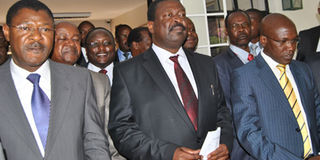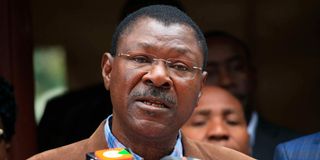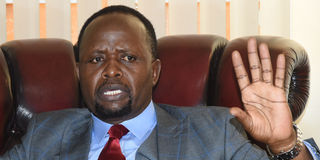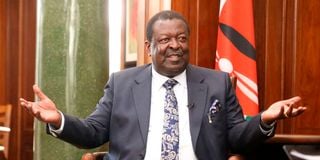Luhya leaders flex muscles in region’s leadership battle

Prime Cabinet Secretary Musalia Mudavadi, (centre), National Assembly Speaker Moses Wetang’ula (left), Kakamega Senator Boni Khalwalle (right) and other western Kenyan leaders
What you need to know:
- Apart from its diaspora voters in most cosmopolitan towns in the country, the region alone consisting of Kakamega, Bungoma, Busia, Vihiga, and Trans Nzoia boasts of a total of 2,616,929 registered voters according to the 2022 election data from the Independent Electoral and Boundaries Commission (IEBC).
- Kakamega has (844,551), Bungoma (646598), Busia (416,756), Vihiga (310,043), and Trans Nzoia (398,981) voters.
The sustained attacks by Trans Nzoia Governor George Natembeya targeting National Assembly Speaker Moses Wetang’ula has set tongues wagging in the Western region, amid clamour for the region’s kingpinship.
Prime Cabinet Secretary Musalia Mudavadi, ODM Deputy Leader Wycliffe Oparanya, DAP-K leader Eugene Wamalwa, ODM Secretary General Edwin Sifuna, his United Democratic Alliance (UDA) counterpart Cleophas Malala, Mr Wetang’ula and Mr Natembeya, are some of the leaders leading the pack in the efforts to have control of the restive region.
Other leaders whose names are being mentioned in the region’s leadership contest are; Central Organisation of Trade Unions (Cotu) Francis Atwoli, who has been instrumental in pushing for unity of the ‘Mulembe Nation,’ Kakamega Senator Boni Khalwale, and Governors Paul Otuoma (Busia), Fernandes Barasa (Kakamega), Kenneth Lusaka (Bungoma) and Wilbur Ottichilo (Vihiga).
It is, however, the sustained attacks by Mr Natembeya in the past few days against Mr Wetang’ula that have ignited talk of the clamour for leadership control of the Western region.
Apart from its diaspora voters in most cosmopolitan towns in the country, the region alone consisting of Kakamega, Bungoma, Busia, Vihiga, and Trans Nzoia boasts of a total of 2,616,929 registered voters according to the 2022 election data from the Independent Electoral and Boundaries Commission (IEBC).
Kakamega has (844,551), Bungoma (646598), Busia (416,756), Vihiga (310,043), and Trans Nzoia (398,981) voters.
Mr Wetang’ula has managed to mobilize several MPs from the Western region to his fold, courtesy of his current position as Speaker of the National Assembly.
In January, he was hosted by the leadership of the Western caucus members of Parliament at their new year inaugural consultative meeting at Keekorok Lodge in Maasai Mara, where regional politics also took centre stage.

National Assembly Speaker Moses Wetang’ula.
“I shared with the leaders from the pot of wisdom of Chinua Achebe, who said; that a man who calls his kinsmen to a feast does not do so to save them from starving.
"They all have food in their own homes. When we gather together in the moonlit village ground it is not because of the moon.
"Every man can see it in his own compound. We come together because it is good for kinsmen to do so," Mr Wetang’ula said after the meeting.
But it is the sustained attacks targeting him by Mr Natembeya, the Trans Nzoia Governor that has lifted the lid on the clamour for political control of the region.
“You cannot claim to be in government when you only have a handful of people behind you and you do not push the agenda for the people.
"Let me tell you and this is the reality, you can never be the president of this Republic if your people are not there to your hands,” Mr Natembeya recently told Mr Wetang’ula in an escalation of the region’s political catfights.

Governor George Natembeya.
Mr Natembeya lamented that the Luhya community would still continue to fill other peoples’ baskets if they don’t unite as leaders who have been in the frontline fail to bring on board the entire community.
"According to the latest census reports we are number two. We are very many but our votes do not count because of leadership that does not care about our people. This time round we are saying we must be on the negotiation table,” he says.
Amani National Congress (ANC) Secretary General Omboko Milemba argues that both Mr Wetang’ula and Prime Cabinet Secretary Musalia Mudavadi are the two senior-most leaders from the Western region serving in government and are tasked with the unity of the region.
“These two leaders deserve respect and we have no quarrel over their ranking in government,” he argues.
There have been concerns about the pecking order between Mr Mudavadi and Mr Wetang’ula in terms of seniority owing to their positions in government.
Mr Mudavadi’s allies insist he is the third in command after Deputy President Rigathi Gachagua while Mr Wetang’ula says as the head of the legislature in the Country, he comes ahead of Mr Mudavadi in the pecking order.
Political analyst Mark Bichachi argues that Kingpinship over tribes is slowly dying, a fact that he says should be celebrated.
He adds that; “what is happening in Luhya land is a competition of ideas and strategy,” hence there should be no fault about it.
“Tribalism will reduce when all tribes have various leaders and thus ideas and strategies can compete vs Kingpinship.
"A similar fate to the Luhya befell the Kikuyu only leaving the Kalenjin and Kamba with kingpins. The luo are also now jostling to replace Raila Odinga,” Mr Bichachi says.
At the moment both Mr Wamalwa (DAP-K) and Mr Oparanya (ODM) have declared their aspirations to become president of Kenya, a move that could further divide the region and deny them votes in one basket.
Mr Wamalwa has joined hands with Wiper leader Kalonzo Musyoka, while Mr Oparanya is currently involved in ODM leader Raila Odinga’s succession battle as the former Prime Minister trains his eyes on the chairmanship of the African Union Commission (AUC).
Asked whether he was keen on serving the country as future Deputy President or President, Mr Mudavadi disclosed that he was focusing on his PCS mandate.

Prime Cabinet Secretary Musalia Mudavadi during an interview at his office in Nairobi on January 10, 2024.
“My primary focus is on fulfilling my current mandate as Prime Cabinet Secretary and Cabinet Secretary for Foreign and Diaspora Affairs.
"These roles are incredibly demanding, requiring my full attention and dedication. I am focused on supporting the President’s agenda through greater coordination of government programs to improve service delivery to our people, at all levels across all regions.
"There is simply too much on my plate to be fantasizing about hypothetical roles in the future,” Mr Mudavadi told the Nation.
He says that serving the people of Kenya is an immense honour and “speculating about future elections is a distraction from the critical work we must do today.”
“The time for such discussions will come much later and when it does, Kenyans will have the chance to choose their leaders based on performance and their vision for the future,” adds Mr Mudavadi.
Political analyst Dismas Mokua argues that some leaders creating clan-based feuds in Western Kenya have no capacity nor competence for national leadership.
"They should consider investing time in building national brands and political capital before attempting to engage with political heavyweights.
"Some leaders from Western Kenya have engaged in clan-based political competition and lost sight of the national price.
"They use clan-anchored feuds for political strategy instead of demonstrating capacity and competence in ideas,” says Mr Mokua.
Mr Wetang’ula and Mr Mudavadi, he says, have “earned their colors in the national political space.”
“PCS Mudavadi has a stellar record in the public service and his fingerprints are all over landmark policy decisions that have transformed Kenya. His decision to support President Ruto via the Kenya Kwanza coalition comes to mind as the now celebrated earthquake moment sealed the deal for President Ruto.”
“Only political novices can underestimate Mr Mudavadi,” adds Mr Mokua.
Another analyst Mr Herman Manyora argues that what is happening in Mulembe Nation is akin to what is happening in Mt Kenya where junior politicians are being used to fight Deputy President Rigathi Gachagua.
“These juvenile fights leave a region in disunity, disenfranchised, and easily open to manipulation by others. The people of Mt Kenya may end up paying for their infighting and disunity just as the Luhya may regret fighting amongst themselves,” Mr Manyora says.





